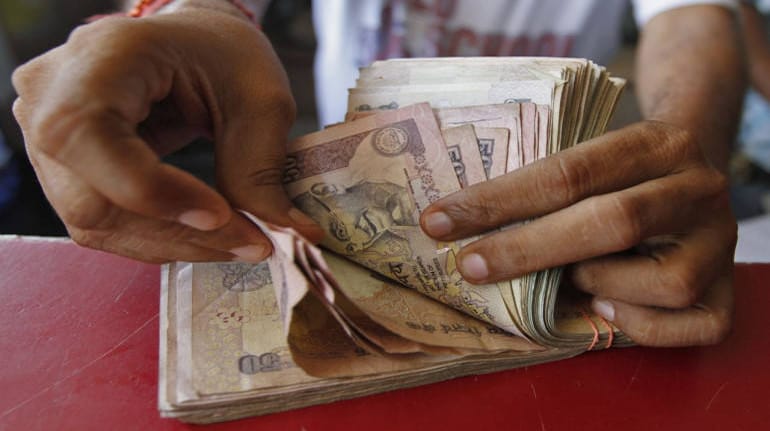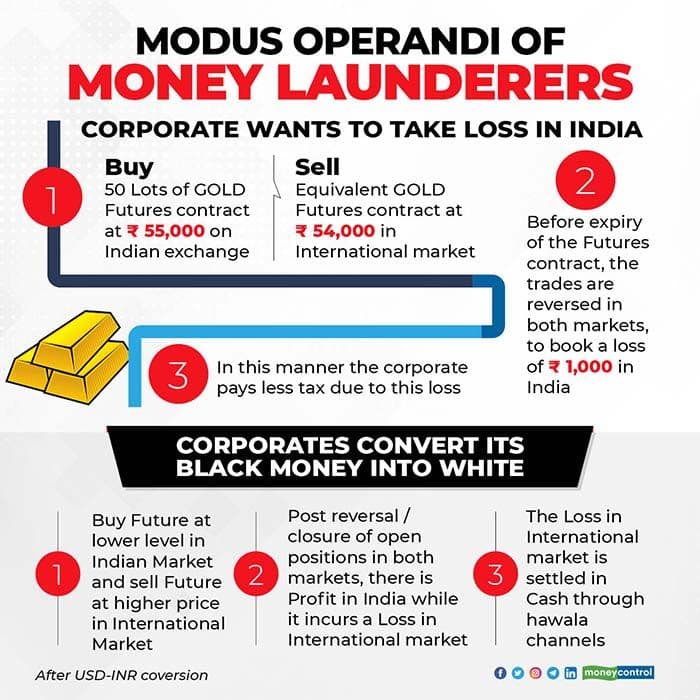



The Enforcement Directorate and Central Board of Direct Taxes have received complaints indicating that trading in international commodity exchanges has become a new way of tax evasion. Corporate houses, traders and high-networth Investors are reportedly trading in international commodity exchanges and settling profits and losses in cash through the hawala route.
Market expert feels this route was used to launder more than Rs 1,000 crore outside the country during the lockdown alone. Here, HNIs and commodity traders simultaneously take two positions in gold or silver or crude. One position is taken in Indian exchanges and a second is in international exchanges, opposing the position taken in India.
This method came to the fore after a major crackdown on long-term capital gains and illiquid options trading, which were said to be a major source of tax evasion for corporates and HNIs.
“Recent investigations found some random companies, which do not have proper businesses, making losses in commodity exchanges. Further investigation found these random companies were related to large group companies and might be using the exchange route for tax evasion,” a source close to the development told Moneycontrol.
Speaking on condition of anonymity, another source in the jewellery market said: “Trading in international commodity exchanges is quite common in the market. This is like Dabba trading in a professional way, via high-end phone applications”.
Modus operandiLarge traders, including corporates wanting to use or convert their black money, are said to be relying on this mechanism. Traders or corporate houses that want to trade on international exchanges need to submit margin money with companies that facilitate such trades. These companies have high-end phone applications at par with any market trading app, providing rates and trade execution facilities. Every weekend trade settlements take place.

A source explained how it works: “Depending on whether the person/entity wants to show a higher profit or loss in India, the trader enters into two sets of transactions, involving trades on an Indian exchange and on an international exchange.”
Elaborating on the mechanics, the source said: “If a corporate has a tax liability of, say, Rs 5 crore, it takes simultaneous positions (trade) on the Indian exchange and International exchange, i.e. a buy trade on one exchange and a sell in the other exchange.
If the corporate is desirous of booking a loss in its books in India, then the initial leg of the buy and sell is executed such that it is a loss-making transaction. For instance, Futures are bought at a high price in India and sold at a low price (the underlying asset is the same) on an international exchange.
“Presuming that prices in both these markets move in tandem, the reversal of the positions anytime before the expiry of the Futures in both markets therefore results in a loss in India and a profit overseas. A loss of, say, Rs 2 crore reduces the tax liability of the corporate in India to that extent, while nearly the same amount of profit on the international exchange is then settled in cash,” the source said.
If corporates and HNIs want to convert their black money into white, they enter into a transaction that makes a profit here and a loss in the international market. For instance, if an HNI has Rs 10 crore cash he takes a position both on the Indian exchange and the international exchange. The HNI makes a loss in the international exchange, which he will pay for in cash, and will make a profit of the same amount in the Indian market, where the trades are legitimate. So, he will easily be able convert his black money into white.
Basically, he will buy a futures contract at a lower level in India and sell in the international futures market when the price is high in comparison with the Indian exchange.
“Several times during the day, Indian exchanges are trading either at a discount or at a premium as compared with international exchanges,” a market expert pointed out.
The trades on the Indian exchange are all legitimate as they are carried out through SEBI-registered brokers, with funds being routed through regular banking channels. The resultant profit or loss from those trades help the trader achieve the desired tax incidence or implications in India, besides helping him use his unaccounted cash (black money) against trades on the International exchange, he explained.
However, the source added: “Such trades on Indian exchanges raise questions on the effectiveness of monitoring, supervision and compliance of AML (anti money-laundering) guidelines by the authorities, exchanges and brokers, respectively."
The Angadia linkA trader who makes use of this service explains how it works. If a trader makes a profit then he gets money from an ‘Angadia’ who runs this business. Similarly if the trader makes a loss then he has to give money to the ‘Angadia’. The Angadia service is mainly used to carry diamonds from Mumbai to Surat. However, here cash is also transferred to any part of India, Hong Kong and Dubai.
The main Angadia market adjoins Asia’s biggest gold market, Zaveri Bazaar, in Mumbai. If somebody wants to send cash to Delhi, it is handed over to an Angadia. He will provide a code that needs to be sent to the receiver. The receiver presents the code to the Angadia at his end, and after it is verified, the money is handed over.
Dubai, where many Indians run businesses, is a popular destination for such trading.
What the law saysLegally, Indians are not allowed to take derivatives positions or money used for margin payment in international exchanges. The Liberalised Remittance Scheme of the Reserve Bank of India allowed $250,000 to be sent out of the country for investment or education purposes but not for derivative trading.
“Hawala transactions and traders continue to remain a major conduit for money laundering. Over the years, traditional use of Hawala has diversified and the genre of illegal activities has only expanded. A concerted crackdown from India in coordination with foreign counterparts is necessary to address this challenge, failing which one trader goes down for another to emerge,” said Sherbir Panag, Partner at PB law.
Jewellers’ associations have started complaining to the Home Ministry, Income Tax and Enforcement Directorate against such trades. Volatility in gold and silver trading has led to traders in these precious metals recording major losses.
Discover the latest Business News, Sensex, and Nifty updates. Obtain Personal Finance insights, tax queries, and expert opinions on Moneycontrol or download the Moneycontrol App to stay updated!
Find the best of Al News in one place, specially curated for you every weekend.
Stay on top of the latest tech trends and biggest startup news.